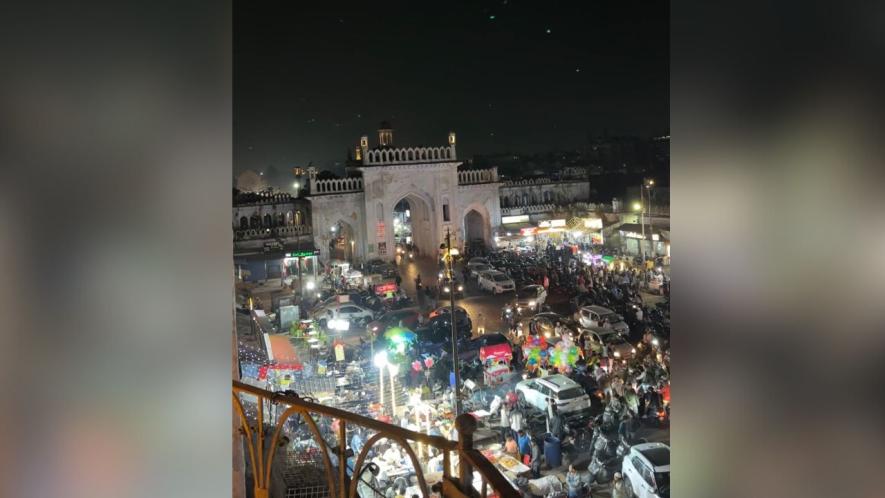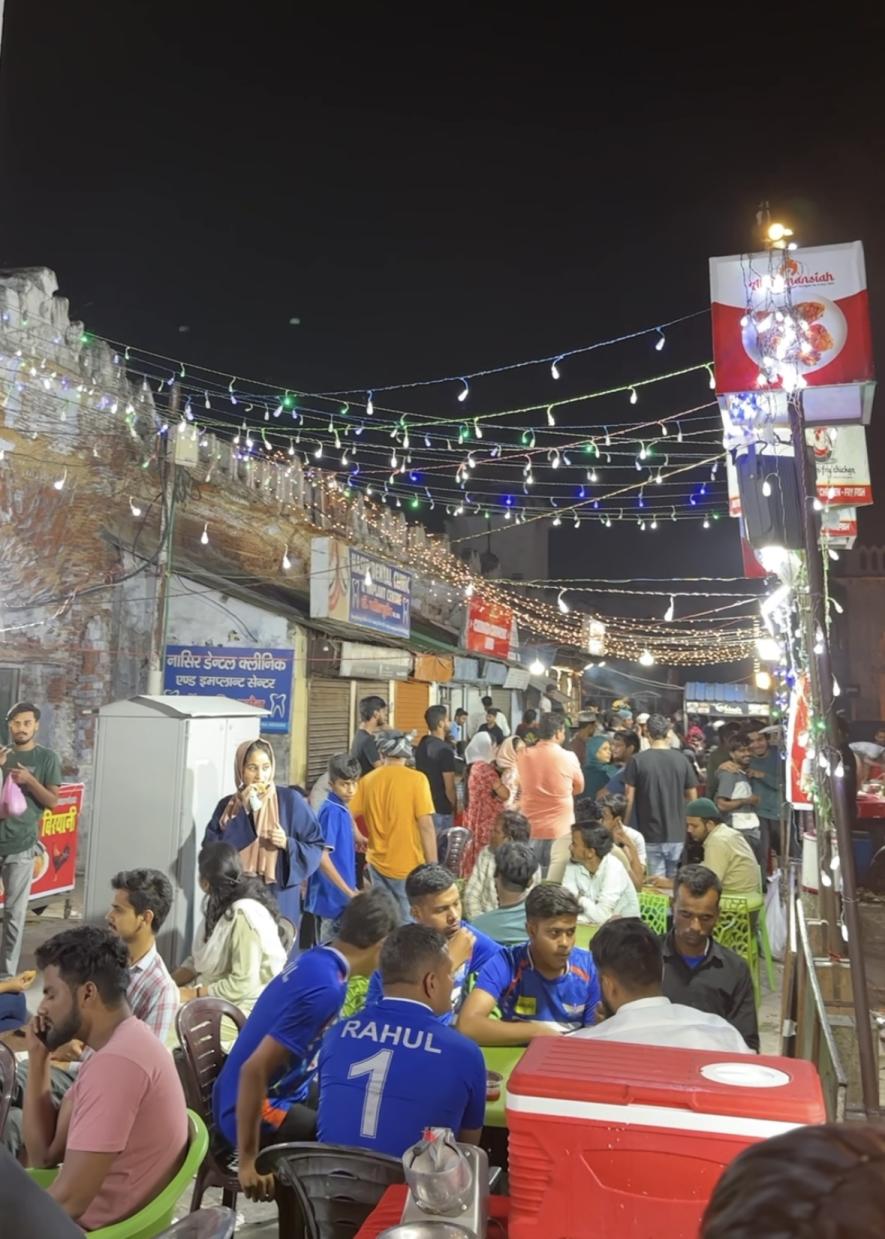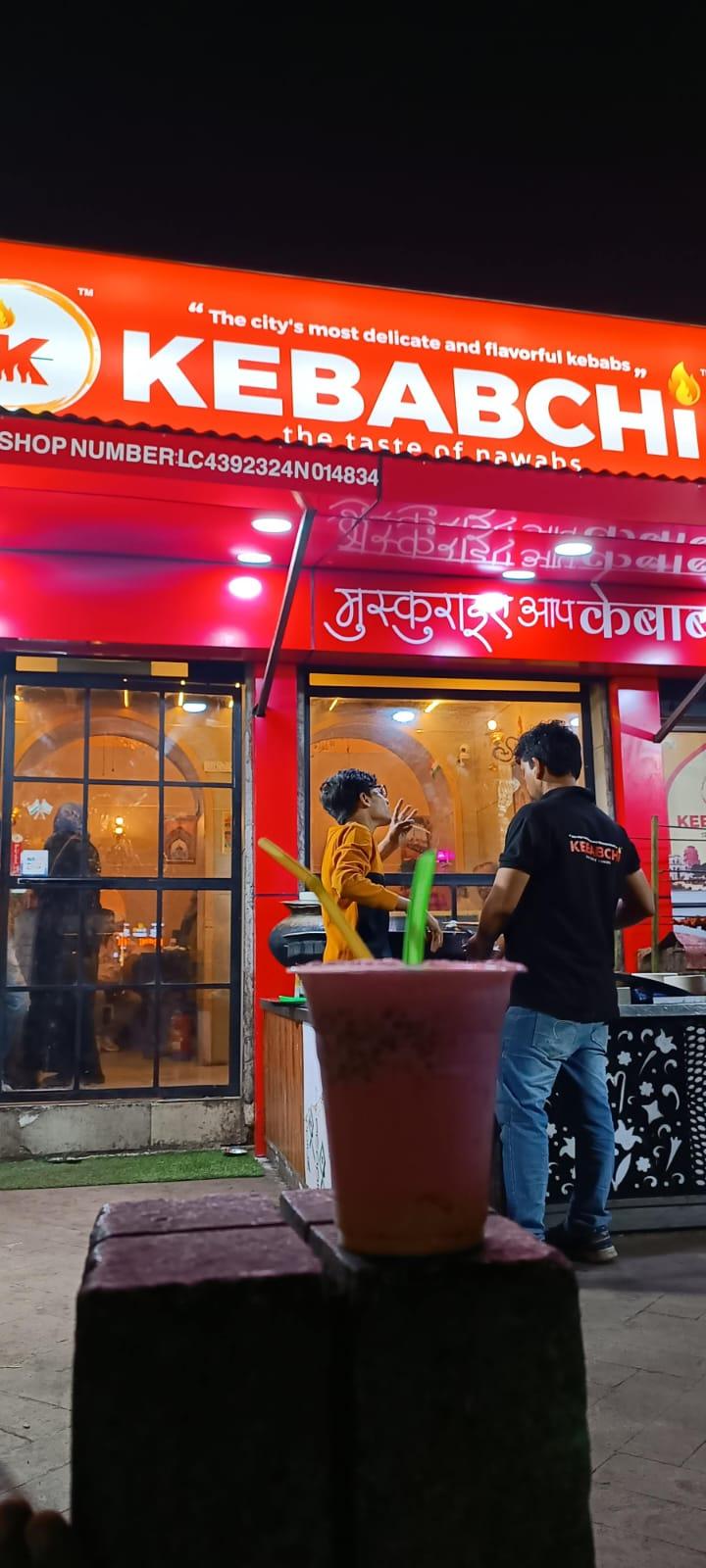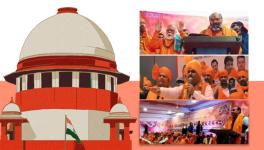UP Nameplate Diktat Sparks Fear of Communal Divide

Lucknow: Chota Imambara, nestled in the heart of Lucknow, the capital of Uttar Pradesh, has swiftly emerged as a go-to destination for food aficionados. Boasting a diverse array of culinary delights ranging from Indian to Arabian cuisines and Afghan snacks, along with delectable desserts and Iranian tea, the area caters to a wide spectrum of palates.
Hamid Hussain has been running a restaurant – Kebabchi -- for the past three years, serving food of the era of Nawabs, who have become extinct. He serves varieties of kebabs from Galawat to the fiery Sambhali, the tender Pasanda to the iconic Kakori, including Mughlai dishes.
Amid the lively atmosphere of old Lucknow, the bustling street scene contrasts sharply with the look of concern etched on Hamid's face. He seems distracted, his furrowed brows and distant gaze telling a story of worry ever since UP Chief Minister Yogi Adityanath's Bharatiya Janata Party (BJP) government recently directed eateries, fruit shops, restaurants and tea stalls across the state to prominently display the name and address of their operator, proprietor and manager, install CCTV cameras and ensure that its chefs and servers wear masks and gloves to ensure cleanliness.
"Every government has its own set of rules, but the BJP government's treatment of local restaurants is obstinate. Don't the state's most well-known food franchises, like Burger King, Taco Bell, McDonald's, and KFC, fall under its purview? Why haven't they been asked to display the identities of its owners?” he said, adding that “In actuality, the owners of these big brands do not reside in the state and work on the franchise module.”
Alleging bias against local eateries, Hamid told Newsclick, “What kind of disparity is this, that despite proprietor companies (local brands) that come under the Ministry of Micro, Small and Medium Enterprises (MSME) and promote local cuisines, who also pay a huge tax to the state government, are still being asked to display names or face scrutiny?”
Hamid pointed out that a large amount of profit made by big pizza, burger brands etc. brands go to foreign countries the franchise owners belong to, but their owners are not asked to display the name. Why?
“The government should promote local brands instead of asking us to display names, as we are the part of country's economy. Furthermore, all labourers and chefs working in these restaurants are surviving on cash, as they do not have bank accounts. The cash that rotates in the country also has our contribution. Therefore, the government should show some leniency to home brands,” he added.
Asked about the repercussions of displaying the name of the owners, Hamid said the kind of environment that has been created in this country in the past few years, this decision would create more rift between Hindus and Muslims. “Both communities come to my restaurant and the ratio is 60:40. After the decision, the footfall may decrease. People of other faiths will hesitate to eat at Muslim shops," he said.
Hamid, whose father is also a renowned chef, said the government should instead focus on food hygiene and link all eateries and restaurants with the Food Safety and Standards Authority of India (FSSAI).
“If a customer wants excess details of owners, he will get it sitting at home by entering the FSSAI number, as we are living in a digital era. Why ask for display of names”, he added.
Barely 3 km from Kebabchi, there is another restaurant named Tundey Kababi, known for its 'melt-in-mouth' kebabs. In a global showcase of culinary excellence, Tundey was among three Indian treasures that bagged a spot in the Top 10 legendary eateries worldwide.
Abu Baqar (50), the owner, who is a third generation person into the ‘kebab paratha’ business also expressed concern that the country's already existing sectarian divisions might worsen as a result of the latest government edict in UP.
“More Hindus than Muslims come to eat kebab-paratha at our place because we are famous not only in India but across the world. Tunday is a brand and people who come here, both Hindus and Muslims, know that the owner is a Muslim. Therefore, this decision won't make much difference to us, But, those who don't have a name/fame or have opened new outlets, their business will be affected. Also, the government's concern should be hygiene, which must be followed by all. What is the logic of putting proprietor and manager names? Why are we being asked to disclose our identity now? What will the government achieve by doing this apart from dividing both communities?” asked Abu Baqar, adding that “the customers do not care about the name, only the taste matters to them.”
Muslim businessmen have also expressed worries about their safety after the order comes into force. Fruit vendor Mohd Danish from Muzaffarnagar said, "Who will ensure my safety if my name is displayed on my cart? Anyone can rob me or mistreat me. What will happen when there is a riot-like situation? I'll be facing danger in the open."

His sentiments capture the fear of many Muslims who struggle with vulnerability that comes with openly identifying oneself. The worry of a potential physical assault, harassment, or being a target during communal disturbance weighs heavily on them.
WHAT THE ORDER SAYS
Politics in Uttar Pradesh is heating up again following the recent directive asking eateries, dhabas, fruit shops, restaurants and tea stalls to display nameplates indicating proprietors' details and managers, ostensibly to prevent alleged incidents of “spitting and mixing of urine” in eatables.
“The names and addresses of the operator, proprietor, manager, and other relevant personnel should be prominently displayed at food establishments. In this context, necessary amendments should be made to the Food Safety and Standards Act to ensure compliance,” said a government statement issued after the Chief Minister held a high-level meeting on September 24.
According to the statement, the Chief Minister, during the meeting said, “In recent times, incidents of adulterating food items such as juice, dal, and roti with human waste, inedible, or dirty substances have been reported from various parts of the country. These acts are atrocious, posing a serious threat to public health. Such malicious practices are completely unacceptable. To prevent such occurrences in Uttar Pradesh, concrete measures must be put in place to ensure food safety and protect the health of the common man.”
Read Also: UP: For Kanwar Yatra, Meat Shops Shut, Covered to 'Respect' Hindu Sentiments
This came two months after the Supreme Court stayed the enforcement of similar directives issued by police in UP and Uttarakhand to eateries along the Kanwar Yatra route to display names of the owners.
In the Supreme Court, a bench of Justices Rishikesh Rai and SVN Bhatti had said that shopkeepers should write down the type of food they are selling, but they cannot be forced to reveal the names of the owners or employees.
The apex court had said that it was permissible for the administration to ensure that the Kanwariyas get vegetarian food that is clean and according to their choice.
The court had also said that to ensure this, the administration can issue orders under the provisions of the Food Safety and Standards Act 2006 or the Street Vendors Act 2014.
Commenting over the government order, social activist, Sandeep Pandey told NewsClick, “In spite of the Supreme Court order on July 22, 2024, staying a directive requiring shop owners and hawkers to display their names outside their premises during the Kanwar Yatra season, the UP government has once again come out with a similar directive requiring display of names and addresses of eatery operators, proprietors and managers. This is another facet of the ‘Gujarat Model’ now being implemented in other parts of India, an extension of communal politics. In Gujarat, dominant communities like Patels are known to only patronise their fellow community businesspersons. The Hindu-Muslim segregation is a more obvious aspect there. It is interesting that right now names of cooks and waiters are not being required to be mentioned. It remains to be seen how many of these communal-minded people, who by extension are also casteist, would accept food prepared and served by Dalit and backward classes, if the names of cook and waiters were also to be revealed. No need to say that this move of UP government will only deepen the wedge of communal and caste divisions.”
‘IT WILL NOT AFFECT HINDU SHOPS’
Starting from Lucknow till Gorakhpur via Ayodhya on NH-28, there are dozens of hotels, dhabas and restaurants on both sides of the stretch. One can easily find veg and non-veg shops on the highway.

Maninder Singh has been running a restaurant for the past 15 years on highway. He believes such order was needed. “I have already placed an order for the nameplate to be made. The name will make it clear whose shop it is. This order will not affect Hindu shopkeepers because we take care of cleanliness. However, after this order, Hindu customers will avoid going to Muslim shops but it was mandatory to bring such order to prevent incidents like spitting and mixing urine in food,” he added.
Another Vaishno Dhaba owner Kuldeep said, “Ayodhya is a holy city and it is important to make public the owners' names in all the dhabas on the highway because the devotees have a right to know what they are eating and where they are eating.”
Lenin Raghuvanshi, a Dalit activist in Varanasi told NewsClick that this decision by the Yogi government may have serious social and legal repercussions, particularly for Dalit and Muslim restaurant owners.
"From a human rights perspective, this decision could result in increased targeting and discrimination against vulnerable communities. Dalit and Muslim restaurant owners already face significant social stigma, and publicly displaying their names and addresses could make them more susceptible to harassment, threats, and violence. Instead of enhancing food safety, this rule could exacerbate existing prejudices and fuel communal tensions, particularly in a socio-political climate that already marginalises these groups,” he further added.
He further said that additionally, this measure may have the unintended consequence of discouraging people from running food businesses due to fear of public backlash, further entrenching systemic inequalities.
“A more balanced approach would involve strengthening food safety regulations and enforcement, without jeopardising the safety and dignity of marginalised business owners,” he added.
However, a question has also arisen that despite the Supreme Court's order on banning the writing of names, is this new order of the UP government a violation of the apex court's interim order?
Supreme Court lawyer Mahmood Pracha said, "A petition is pending in the Supreme Court on this issue. This order is an attempt to escape the Supreme Court's order."
"If someone is indulging in adulteration, there is already a law to deal with it. As far as the question of getting the name written is concerned, there are rules for that too. Small shopkeepers display registration papers while big establishments display licenses," he added.
The writer is a freelancer based in Lucknow, Uttar Pradesh.
Get the latest reports & analysis with people's perspective on Protests, movements & deep analytical videos, discussions of the current affairs in your Telegram app. Subscribe to NewsClick's Telegram channel & get Real-Time updates on stories, as they get published on our website.
























